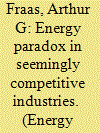| Srl | Item |
| 1 |
ID:
110402


|
|
|
|
|
| Publication |
2011.
|
| Summary/Abstract |
To investigate how fuel economy is valued in the Indian car market, we compute the cost to Indian consumers of purchasing a more fuel-efficient vehicle and compare it to the benefit of lower fuel costs over the life of the vehicle. We estimate hedonic price functions for four market segments (petrol hatchbacks, diesel hatchbacks, petrol sedans, and diesel sedans) to compute 95% confidence intervals for the marginal cost to the consumer for an increase in fuel economy. We find that the associated present value of fuel savings falls within the 95% confidence interval for most specifications, in all market segments, for the years 2002 through 2006. Thus, we fail to consistently reject the hypothesis that consumers appropriately value fuel economy.
|
|
|
|
|
|
|
|
|
|
|
|
|
|
|
|
| 2 |
ID:
166469


|
|
|
|
|
| Summary/Abstract |
Several federal agencies claim the existence of an energy paradox in competitive markets in their benefit-cost analyses: firms fail to use energy-saving equipment that on net would reduce their costs. Such findings appear incompatible with neoclassical views that private firms in competitive markets will seek to minimize costs. EPA and NHTSA (2016) justify their findings in part by claiming that owners of trailers pulled by others underinvest in energy-saving equipment because the trailer owners incur the costs of such investments while tractor owners get the benefits. We collected roadside data over three summers and model use of energy-saving equipment on trailers. We find associations consistent with cost-reducing behavior in the use of energy efficiency devices, such as skirts and automatic tire inflation devices, but no evidence that different ownership of tractors and trailers is associated with reduced use of energy-saving equipment on trailers. We recommend that EPA and NHTSA assess the in-use cost-effectiveness of such equipment and rigorously review the empirical basis for claims of market failures in competitive markets before claiming significant private economic gains in rulemakings.
|
|
|
|
|
|
|
|
|
|
|
|
|
|
|
|
| 3 |
ID:
097188


|
|
|
|
|
| Publication |
2010.
|
| Summary/Abstract |
This paper reviews current capital budgeting practices and their impact on energy efficiency investments. The prevalent use of short payback "rule-of-thumb" requirements to screen efficiency projects for risk is shown to bias investment choices towards "sure bet" investments bypassing many profitable efficiency investment options. A risk management investment strategy is presented as an alternative to risk avoidance practices applied with payback thresholds. The financial industry risk management tool Value-at-Risk is described and extended to provide an Energy-Budgets-at-Risk or EBaR risk management analysis to convey more accurate energy efficiency investment risk information. The paper concludes with recommendations to expand the use of Value-at-Risk-type energy efficiency analysis.
|
|
|
|
|
|
|
|
|
|
|
|
|
|
|
|
| 4 |
ID:
149855


|
|
|
|
|
| Summary/Abstract |
The benefit-cost analysis of standards to reduce vehicle greenhouse gas emissions and improve fuel economy by the U.S. Environmental Protection Agency (EPA) and the Department of Transportation (DOT) displays large net benefits from fuel savings for new vehicle buyers. This finding points to an energy efficiency gap: the energy-saving technology provided in private markets appears not to include all the technologies that produce net private benefits. The gap exists if the costs of energy-saving technologies are lower than the present value of fuel reductions, and “hidden costs” – undesirable aspects of the new technologies – do not exceed the net financial benefits. This study examines the existence of hidden costs in energy-saving technologies through a content analysis of auto reviews of model-year 2014 vehicles.
|
|
|
|
|
|
|
|
|
|
|
|
|
|
|
|
| 5 |
ID:
125683


|
|
|
|
|
| Publication |
2013.
|
| Summary/Abstract |
Prospect theory holds that human beings faced with a risky bet will tend to value potential losses about twice as much as potential gains. Previous research has demonstrated that prospect theory could be sufficient to explain an energy paradox in the market for automotive fuel economy. This paper analyzes data from questions added to four commercial, multi-client surveys of 1000 U.S. households each in 2004, 2011, 2012 and 2013. Households were asked about willingness to pay for future fuel savings as well as the annual fuel savings necessary to justify a given upfront payment. Payback periods inferred from household responses are generally consistent over time and across different formulations of questions. Mean calculated payback periods are about 3 years, but there is substantial dispersion among individual responses. The calculated payback periods do not appear to be correlated with the attributes of respondents. Respondents were able to quantitatively describe their uncertainty about both vehicle fuel economy and future fuel prices. Simulation of loss averse behavior based on respondents' stated uncertainty illustrates how loss aversion could lead consumers to substantially undervalue future fuel savings relative to their expected value.
|
|
|
|
|
|
|
|
|
|
|
|
|
|
|
|